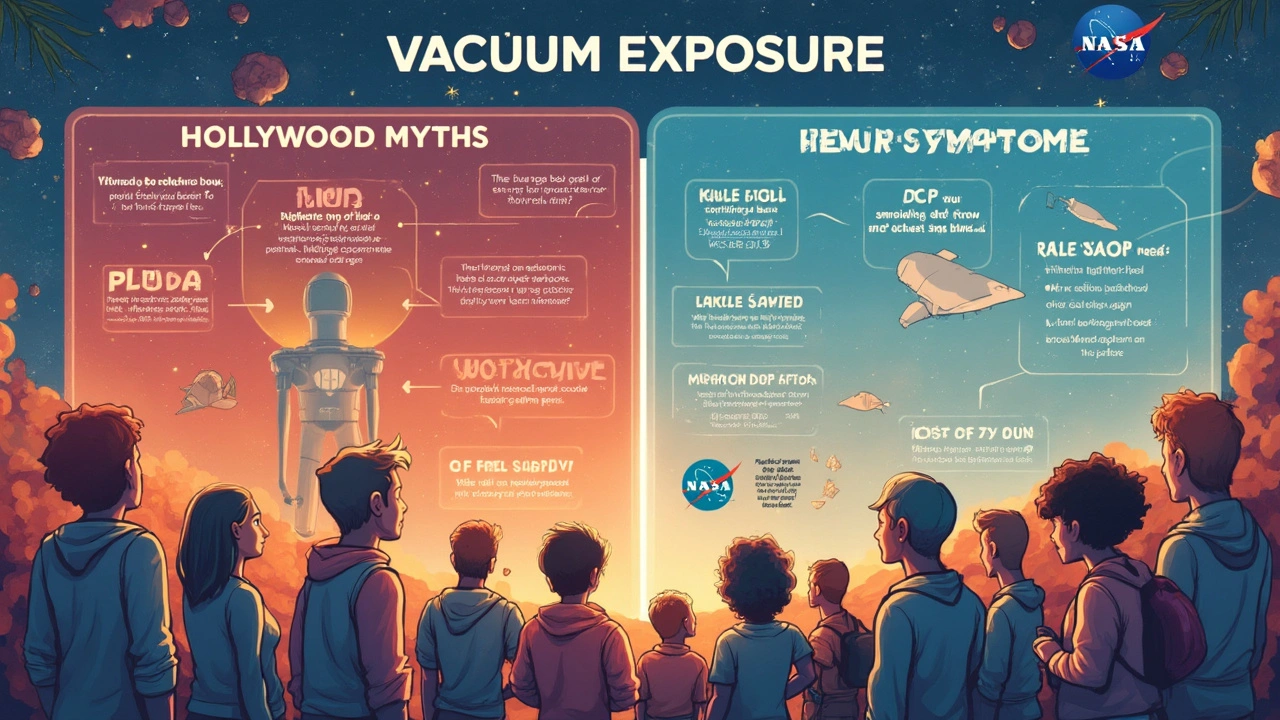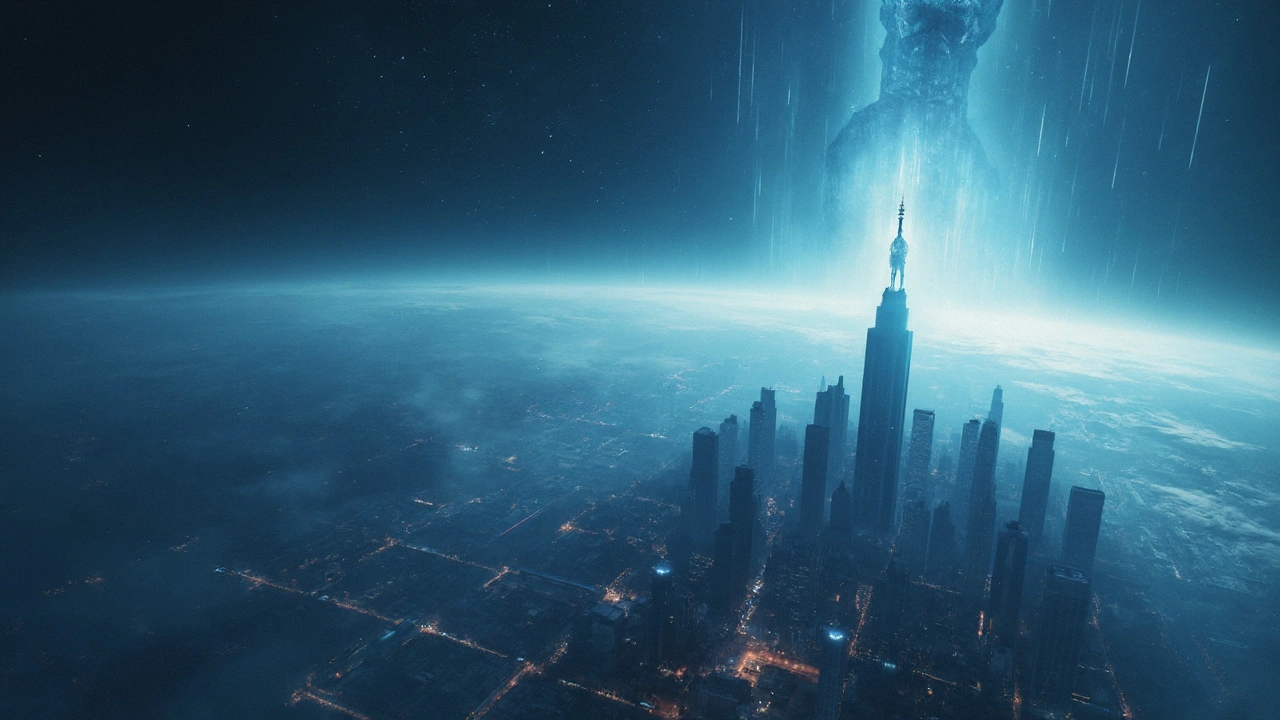You know that scene in sci-fi movies where someone floats into space without a suit and bursts like a balloon? It’s wild, but real science says that’s not how it goes down. The truth about what happens to your body in the vacuum of space is weirder, scarier, and way more fascinating than Hollywood ever shows. Forget what you thought you knew—your body doesn’t pop, but what does happen is a race against time, and no part of it is pleasant.
What Actually Happens to Your Body in Space Without a Suit
So, picture this: you’re drifting through the black, endless silence of space—and you’re not wearing a suit. Maybe you’re thinking you’d freeze instantly or blow up. But the real story is much more complicated. First off, your body is mainly water, and water doesn’t just boil and vaporize instantly at room temperature. But in space, there’s no atmospheric pressure. That means the liquid in your mouth, eyes, and even the surface of your skin starts to vaporize pretty much right away. Your saliva? It would start bubbling on your tongue. That’s not the worst bit.
The air in your lungs is the real danger. If you hold your breath, your lungs can rupture almost right away—a split-second mistake. That’s because the pressure inside them is way higher than in the vacuum of space around you. Every astronaut training manual on earth teaches, in giant bold letters: never, ever hold your breath when air pressure might drop. So, if you ever find yourself accidentally floating outside the International Space Station, let the air out, as odd as that sounds.
What about the cold? Space is cold, but not in the way an icy Adelaide winter morning is cold. There’s no air to pull heat away from your skin fast. You’d eventually freeze, sure, but not instantly. The real worry is asphyxiation. Your brain can function for maybe 10 to 15 seconds before you pass out from lack of oxygen. After that, you’ve got about one to two minutes before your heart stops. All the while, your body would start swelling—maybe twice your usual size—but your skin keeps it all together. It sounds cartoonish, but it’s true, thanks to how stretchy our skin is.
Ever wonder if blood would boil in space? Here’s the truth: your blood won’t boil outright, because your circulation system holds it under your skin’s pressure. It’s just your exposed fluids—tears, saliva, the moisture lining your mouth and nose—that start to fizz. Your organs and tissues hold together. You won’t explode, despite what the movies suggest. A famous case from 1965, when a NASA technician was accidentally exposed to vacuum for about 15 seconds, showed he stayed conscious for 12–15 seconds, passed out, and was fine after recompression. He only noticed the moisture on his tongue bubbling up. Still, don’t try this at home, or anywhere else for that matter.
One more terrifying fact? Ultraviolet rays from the sun hit you hard in space because there’s nothing to block them—no ozone layer, no clouds. You’d get burned, and I mean badly. Your skin could start to burn and crisp up in just a couple of seconds in direct sunlight. If you’re on the shadowed side of a spacecraft, though, you’d cool off to a fatal level. Both ends of the temperature spectrum are deadly. If you somehow found yourself out there, there is a tiny, tiny window where you could survive—if you’re rescued in under 90 seconds. But you’d need to get the bends (decompression sickness), oxygen starvation, and a sunburn all sorted out afterward.

Busting Myths: What Movies Get Wrong About Vacuum Exposure
It feels like every blockbuster space flick has a zero-suit scene. Sometimes they show the person exploding, sometimes instantly freezing, and sometimes just shaking until it’s over. Most of this is way off. The biggest myth is the idea of instant death—real science proves you don't die straight away. There's a 10–15 second window where you're alive, aware, and panicking. Not knowing this might be one of film’s biggest space blunders.
Let’s pull out some specifics. In Stanley Kubrick’s “2001: A Space Odyssey,” astronaut Dave Bowman is thrown out an airlock. He holds his breath (which, remember, can rupture your lungs), but the movie actually gets one thing right: he doesn't explode or freeze, and he moves quickly to get to safety. Most films skip that science. “Guardians of the Galaxy” and “Mission to Mars” are both guilty of making exposure to the vacuum look wild and inaccurate—bodies swelling like balloons or instantly becoming ice cubes. In reality, you'd swell but not burst, and you'd eventually cool, but not instantaneously. It would take a while before freezing because the body loses heat slowly when there’s nothing to conduct it away.
Here’s another busted myth: you don’t instantly lose all bodily fluids. Yes, you’d lose moisture on exposed surfaces (like spit, snot, and tears) but your skin is surprisingly tough. No horror-movie melting, sorry. That famous urban legend about filling up with radiation and bursting? Radiation is a huge problem for long-term survival in space but in those first few, horrifying seconds, it’s not what gets you. It’s lack of air and pressure.
One fact that movies almost never get right is the pain. A real person exposed to vacuum would notice air escaping from lungs and mouth at super speed, and their chest might ache badly as it expands with trapped gases. You’d struggle to exhale fully. The loss of oxygen leads to confusion, panic, and blackout. Eyes wouldn’t pop out of your head, but the moisture would boil away, making you temporarily blind if you survive. There are no fancy graphics for the taste of your own saliva bubbling. It's gross and real.
Another myth busted: sound. Space is vacuum; no air, no sound. You’d hear nothing—even as your heart pounds—or maybe, hopefully, your rescue pod whirs closer. Silence would be complete, except for the whoosh of your own last breath. It’s a kind of quiet most of us have never experienced.
And what if you’re dead in space? Without intervention, your body would float for eternity, mummified or possibly freeze-dried, depending on where in orbit it happens. No instant decaying or skeletonizing. The body would stay surprisingly intact, with the soft tissues drying out in the vacuum. Not the worst way to go, but it’s not pretty, either.
If you’re curious about what would really happen, NASA and ESA training manuals are full of warnings about avoiding accidental exposure. Astronauts train repeatedly on how to avoid leaky hatches and suit failure, and the International Space Station is full of alarms for pressure drops. They practice endless ‘buddy checks’—no one leaves the airlock with a glove unzipped. It’s serious stuff.
Here's a quick table summing up what really happens to your body in space versus movie myths:
| Effect | Movie Version | Real Science |
|---|---|---|
| Body explodes | Frequently | No explosion; swelling only |
| Instant freezing | Often shown | Body cools slowly; doesn’t freeze instantly |
| Immediate death | Always | 10–15 seconds before unconsciousness; 1-2 minutes max survival |
| Eyes pop out | Sometimes | Eyes swell; no popping, moisture boils |
| Silent | Varies | Completely silent, no noise through vacuum |
| Blood boils | Sometimes | Surface fluids boil, blood does not |
| Instant mummification | Rarely shown | Body dries out slowly over weeks/months |

Real Risks, Surprising Survival Stories, and How to Keep Safe in Space
Think only astronauts need to worry about the vacuum of space? Actually, scientists push the boundaries in labs right here on Earth all the time. Space simulators, vacuum chambers—people have learned the hard way what happens when pressure disappears. In 1965, a technician at NASA's Johnson Space Center had his suit rupture inside a vacuum chamber, exposing him to almost zero pressure. He passed out after 12 seconds but was brought back to normal pressure and survived. His only complaint was the taste of fizzy spit. If that’s not the wildest workplace accident, I don’t know what is.
Astronauts use a ton of careful checks and technology to avoid even brief exposure. Spacewalk suits (called Extravehicular Mobility Units—EMUs) are basically tiny spaceships. They have multiple layers, sewn by hand, every stitch checked for leaks. Each layer protects against radiation, temperature extremes, and micro-meteors. If you followed an astronaut’s pre-spacewalk checklist, you’d see step-by-step checks: suit up, check oxygen, check batteries, pressure test, communication test, buddy check. They rehearse emergency procedures for suit rips and pressure loss, too.
If you ever find yourself in space—maybe you’re a future tourist or on a crazy Mars mission—here’s what you need to remember: never hold your breath. If a suit rips or a hatch opens, blow out hard and fast. Get to an airlock within 15 seconds if you want to live. Don’t close your eyes, because boiling tears could temporarily blind you. Don’t expect to be able to hold your breath; most people can’t, and it only ups the danger.
Future missions to Mars, and even private tourist flights, mean more and more non-astronauts will face these risks. Space companies are designing smarter suits—lighter, tougher, less clunky. But human mistakes still happen. Some scientists and designers are even working on emergency quick-seal patches for spacesuits and incredibly fast-acting pressure chambers. The aim is to turn that slim 90-second window of survival into a better shot, just in case.
If you’re still dreaming of floating in space, take some tips from real astronauts: obsess over safety checks, don’t take shortcuts, and if you spot a problem, call for help. You don’t have time to mess around in a suitless emergency. The vacuum won’t wait for anyone.
Turns out, the space without suit challenge isn’t about Hollywood drama. It’s about raw survival, fast action, quick thinking, and a little bit of luck. No explosions, but the truth is still terrifying. The next time you watch a movie astronaut take their helmet off, you’ll know the real story: there’s 15 seconds that matter, and it’s science, not cinema, that will save your life—if you move fast.


10 Responses
Honestly, I think Hollywood really messes it up when it comes to space without a suit. The idea that you just instantly explode is so over the top. From what I understand, the biggest risks come from loss of oxygen and the vacuum itself causing your bodily fluids to boil a bit. It’s bizarre but fascinating.
What really shocked me was that you might stay conscious for about 10 to 15 seconds, which is longer than I thought. Just long enough to realize you’re in a lot of trouble.
Still, no suit means you're not surviving beyond that short window. Makes you appreciate the tech astronauts rely on.
Oh, please. The whole "you won't explode" narrative feels like something cooked up to soothe our fragile human brains. Honestly, if I were in space without a suit, the morbid thought of my eyeballs popping like grapes would keep me up at night. Movies lie to us just like they do with everything else.
And can we talk about how totally neglectful the article must be about radiation exposure? Because, newsflash, space is deadly in more ways than just lack of oxygen.
Like, come on, some of us want the full catastrophic picture, not a sanitized version that feels like a lullaby for wannabe astronauts.
Wait, are we supposed to absolutely trust what these so-called experts say? Everything that happens in space, without suits or not, is part of some hidden agenda. The idea that humans wouldn't just instantly disintegrate or explode sounds way too neat.
I've read and heard stuff that NASA keeps hush about, like the actual speed at which bodily fluids evaporate. You think they would share the whole truth if it damages their image or plans? nah, too shady.
People should question all this info more.
This topic really makes me think about how fragile human life truly is outside Earth’s protective atmosphere. The notion that you could survive for a few seconds, conscious or not, before the inevitable is just sobering.
I wonder about the philosophical implications too. For instance, what does it mean for our understanding of life’s dependence on environment? It also raises questions about the ethics of deep space exploration without foolproof safety measures.
Typos aside, I appreciate articles like this that bring such topics into conversation. Still, I have questions about long-term effects that aren’t often discussed.
Space can be unforgiving, and thank goodness for modern technology and suits. But this article does a great job of cutting through the myths.
It’s true, you wouldn’t explode instantly, but the vacuum effects on the body—like ebullism, swelling, and oxygen deprivation—are no joke. And the advice for aspirants is solid; knowing these facts might save lives one day.
It’s also amazing how quickly one must act in such emergencies. The body can only handle exposure for very brief periods before irreversible damage sets in.
Glad to see the science getting out there clearly.
I'd like to chime in with a bit more structure about the physiology involved here. Basically, the vacuum of space causes your blood to boil at body temperature because of low pressure—this is called ebullism.
Contrary to popular myth, your skin prevents you from exploding like a balloon, but your tissues swell and fluid can vaporize internally.
Oxygen deprivation is the real killer; without air, brain cells can die in under a minute. So even if your circulatory system holds up for a bit, unconsciousness happens fast.
The article captures these points well but I'd add that immediate repressurization is critical to survival.
Really, if you dive into actual scientific papers instead of fluff pieces, you'll find the reality is a bit more nuanced. For one, the idea that "you won't explode" is mostly correct, but only partially meaningful. There's a spectrum of damage inflicted depending on exposure duration and conditions.
The article glosses over the complexities of fluid dynamics in microgravity and how radiation interacts with unprotected tissue, which can cause DNA damage fairly quickly.
But okay, I'll concede it goes further than most pop science tries to.
Honestly, I think there's more to this story that they aren’t telling us. For example, what about the experimental research done in secret? I bet NASA has test subjects or robots that have been exposed to vacuum for long periods—but we never hear about it.
The fact that they say people don't explode could just be a cover-up for the truth. Maybe the reality is worse but classified.
Anyone else feel like the public only gets sanitized versions of space dangers to keep us calm?
Hi everyone, just jumping in to clarify a few scientific points from a research perspective. The article is mostly accurate but some nuance helps.
Yes, exposure to vacuum leads to ebullism where dissolved gases in body fluids form bubbles, causing swelling. But thanks to our skin's tensile strength, the body does not explode. The lack of oxygen leads to unconsciousness in about 15 seconds and death follows shortly without repressurization.
Radiation exposure is something astronauts guard against because it accumulates over time and can lead to serious long-term health issues.
It's a good, concise primer for those interested in space physiology.
Wow, so many layers here. I really appreciate the sarcastic points raised but honestly, I’m on the optimistic side. Technology is advancing and learning about these harsh realities is crucial in pushing human exploration further.
The fact we can discuss the exact timeline for survival without a suit is astounding to me. It guides safety protocols and emergency preparedness.
I do think this kind of info should be common knowledge, not just flashy headlines about ‘space explosions’ or CGI disasters.
Anyway, fascinating read and props to the author for busting myths.